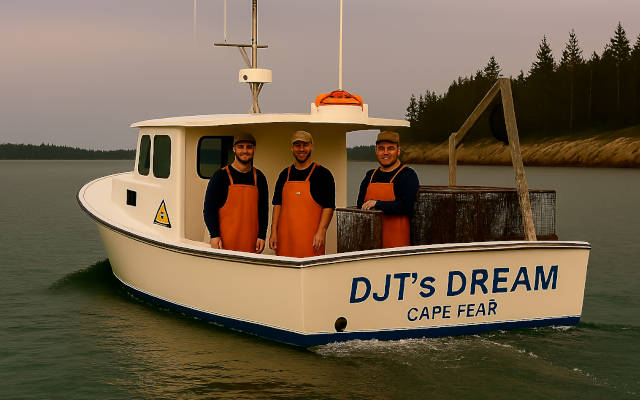Electrifying Maine's Working Waterfront

Maine Electric Workboat illustration generated by Copilot
By EVWorld Si Editorial Team
Maine's iconic working waterfront is undergoing a quiet revolution. With more than 100,000 registered boats and a deep maritime heritage, the state is now exploring electric propulsion as a path toward decarbonization. Leading the charge is the Island Institute, a nonprofit focused on sustainability and community resilience along Maine's coast.
Demonstration Projects Spark Momentum
In partnership with electric outboard manufacturer Flux Marine, the Island Institute launched “Take Charge,” a 13-foot electric skiff designed to showcase the potential of clean marine technology. Since then, more than a dozen vessels have been electrified, including boats used by oyster farms, boat clubs, and educational programs.
Flux Marine is currently testing a 100-horsepower electric motor to expand capabilities for heavier-duty applications. While range and charging remain challenges, the demonstration projects have proven that electric boats can meet the needs of many nearshore operations.
Charging Infrastructure and Workforce Development
Charging infrastructure is a critical hurdle. Most electric boats rely on overnight charging, and few docks are equipped with high-capacity power. To address this, the Island Institute is working with Maine Electric Boat Co., the Midcoast School of Technology, and local community colleges to train technicians in electric-boat maintenance and installation.
These efforts aim to build a skilled workforce and create a support ecosystem for electric marine technology, similar to what’s emerging in the automotive EV sector.
Policy and Incentives on the Horizon
Advocates are exploring policy mechanisms to accelerate adoption, including tax incentives, grants, and financing models modeled after successful EV and heat pump programs. State-level support is seen as essential to scaling infrastructure and reducing upfront costs for boat owners.
For comparison, Maine’s Efficiency Maine program has helped thousands of residents transition to electric vehicles and heat pumps. A similar approach could catalyze marine electrification.
Oyster Farms Lead the Way
At Maine Ocean Farms, co-founder Carter Newell is deploying a 28-foot aluminum electric workboat with twin propellers and a 25-mile range. The vessel will support harvesting, deliveries, and eco-tours, all powered by solar-charged batteries.
Meanwhile, Shred Electric, founded by Nick Planson, is developing solar-powered refrigeration units and upwellers for aquaculture. Their Shred Cube uses recycled insulation and solar panels to keep oysters cool without diesel generators.
Other farms, including Deer Isle Oyster Company, are adopting electric pickups, solar tumblers, and dockside charging stations. Island Institute grants have helped fund these upgrades, creating a ripple effect across the industry.
Boatbuilders Embrace the Shift
Traditional boatbuilders like Hylan & Brown Boatbuilders are now offering electric retrofits and custom electric designs. Their clients include climate-conscious sailors and those seeking quiet, low-speed cruising. Even their own yard skiff now runs on solar-charged electric power.
Conclusion
Maine’s electrification push blends grassroots innovation, nonprofit leadership, and traditional craftsmanship. While challenges remain—especially in cold-weather performance and infrastructure—the movement is redefining what it means to work on the water.
For more on this story, read the original article from Down East Magazine.
Original Backlink
Views: 613
Articles featured here are generated by supervised Synthetic Intelligence (AKA "Artificial Intelligence").
